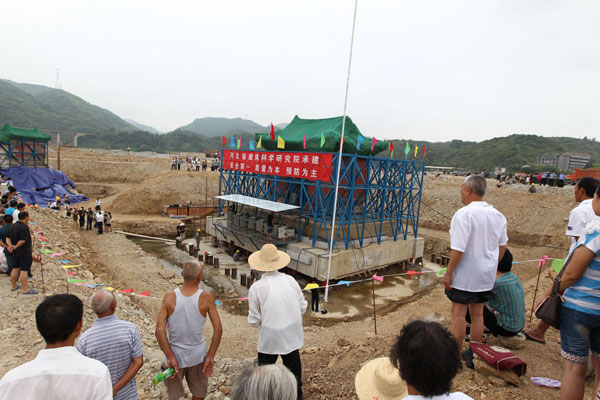Historic palace site to be elevated
Updated: 2012-08-15 07:29
By Wang Xiaodong (China Daily)
|
|||||||||||
A 600-year-old religious building in Central China will be raised 15 meters above ground by the end of the year to keep it from being inundated by a water project.
 |
|
The gate of Yuzhen Palace will be raised 15 meters to avoid being inundated. Zhang Jianbo / for China Daily |
The Yuzhen Palace, which sits on the edge of the Danjiangkou reservoir in the Wudang Mountains in Hubei province, would be submerged after the dam is made taller.
The South-North Water Diversion Project, the world's largest such undertaking, will bring water from the massive Yangtze River in the south to meet demand in drought-prone cities in the north through three water-diversion routes.
"Elevation started on Aug 1 and is expected to be completed before the end of the year," said Dai Zhanbiao, a senior engineer of Hebei Academy of Building Research, the project's contractor.
"By the end of the week, a palace gate had been raised 1 meter."
Seventy-two jacks will raise the main gate of the palace and the gates of the east and west palaces, which have a combined weight of 7,000 metric tons, Dai said.
The project also will raise the foundation and dismantle other vestiges of the site at an estimated cost of 200 million yuan ($31 million), according to Shu Tao, director of Wudang Administration for Cultural Heritage and Religious Affairs.
The other vestiges of the site will be demolished and rebuilt in their original style after the site is elevated, Shu said.
The palace was built in 1412 during the Ming Dynasty (1368-1644) to commemorate Zhang Sanfeng, a Taoist and tai chi master. Originally a complex with hundreds of palaces and rooms, only several gates and vestiges of walls and palaces remain. A main palace was burned to ashes in 2003 in an accidental fire.
The site was included in the UNESCO World Heritage List in 1994.
"The site is as large as 56,780 square meters, so it is too difficult and risky to elevate the whole area," Shu said.
The current elevation plan was chosen after extensive research and debate.
Before the elevation plan was decided upon, experts had proposed two other options for the site. One was to build a dike to separate the palace site from water in the reservoir.
"But the plan was turned down as the site would have been under constant threat from water. Besides, water could have seeped through the dike and damaged the remaining buildings," Shu said.
The other rejected plan called for destroying the current remaining buildings and rebuilding them in their original styles.
"The current plan is the most costly and difficult, but it can best protect the cultural relics," Shu said.
A crucial job for the project is to build new foundations for the existing buildings so the new foundations can serve as platforms that can be raised by jacks underneath them, Dai said.
To protect the buildings from possible damage during elevation, all buildings were reinforced, and the workers will put grout in the new foundation whenever a building is raised 1.5 meters, Dai said.
"Elevating the buildings, the heaviest one weighing more than 4,000 tons, to the equivalent of five floors above their original positions is a huge challenge for us," Dai said.
Wu Hai, a visitor from Wuhan, likes the plan.
"Wudang Mountains are sacred, and I think the world heritage site should be protected," Wu said.
But not everyone agrees.
"It is right to protect cultural relics, but spending 200 million yuan is too expensive, and the amount could have been used to improve the livelihood of the local people," said Yan Chao, a student studying German in Huazhong University of Science and Technology.
This is not the first time in China old buildings have been raised to protect them.
A palace in Nanjing Museum that weighs 7,700 tons was raised 3 meters in 2010 in Nanjing, East China's Jiangsu province.
Gu Xiaochi in Wuhan contributed to this story.
wangxiaodong@chinadaily.com.cn
Related Stories
Kaifeng to restore historical image 2012-08-13 16:56
Historical theater was first left out of plan 2012-08-13 08:11
Zhengzhou taps historic ties to farming sector 2012-08-11 09:50
Commercialization of historic homes stirs controversy 2012-08-02 10:39
Plans for bridge over historic wall spur debate 2012-07-27 19:57
Today's Top News
President Xi confident in recovery from quake
H7N9 update: 104 cases, 21 deaths
Telecom workers restore links
Coal mine blast kills 18 in Jilin
Intl scholarship puts China on the map
More bird flu patients discharged
Gold loses sheen, but still a safe bet
US 'turns blind eye to human rights'
Hot Topics
Lunar probe , China growth forecasts, Emission rules get tougher, China seen through 'colored lens', International board,
Editor's Picks

|

|

|

|

|

|





